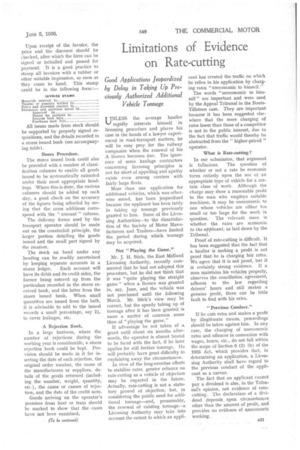Limitations of Evidence on Rate-cutting
Page 41

If you've noticed an error in this article please click here to report it so we can fix it.
Good Applications Jeopardized By Delay in Taking Up Previously Authorized Additional Vehicle Tonnage
NLESS the average haulier rapidly interests himself in licensing procedure and places his case in the hands of a lawyer experienced in road-transport matters, he will be easy prey for the railway companies when the renewal of his A licence becomes due. The ignorance of some haulage contractors concerning licensing principles is not far short of appalling and apathy exists even among carriers with fairly large fleets.
More than one application for additional vehicles, which was otherwise sound, has been jeopardized because the applicant has been tardy in taking up tonnage previously granted to him. Some of the Licensing Authorities—to the dissatisfaction of the Society of Motor Manufacturers and Traders—have limited the period during which tonnage may be acquired.
Not "Playing the Game."
Mr. J. H. Stirk, the East Midland Licensing Authority, recently commented that he had not adopted this procedure, but he did not think that it was "quite playing the straight game" when a licence was granted in, say, June, and the vehicle was not purchased until the following March. Mr. Stirk's view may be correct, but the speedy taking up of tonnage after it has been granted is more a matter of common sense than of "playing the game."
If advantage be not taken of a grant until about six months afterwards, the operator is almost bound to be faced with the fact, if he later applies for still further tonnage. He will probably have great difficulty in explaining away the circumstances.
In view of the long-overdue efforts to stabilize rates, greater reliance on rate-cutting as a vehicle of objection may be expected in the future. Actually, rate-cutting is not a statutory ground of objection, but, in considering the public need for additional tonnage—and, presumably, the renewal of existing tonnage—a Licensing Authority may take into account the extent to which an appli. cant has created the traffic on which he relies in his application by charging rates "uneconomic to himself."
The words "uneconomic to himself " are important and were used by the Appeal Tribunal in the BoutsTillotson case. They are important because it has been suggested elsewhere that the mere charging of rates lower than those of a competitor is not in the public interest, due to the fact that traffic would thereby be abstracted from the " higher-priced " operator.
What is Rate-cutting?
In our submission, that argument is fallacious. The question of whether or not a rate be economic turns entirely upon the use of an appropriate type of vehicle for a certain class of work. Although the charge may show a reasonable profit to the man who employs suitable machines, it may be uneconomic to one whose vehicles are either too small or too large for the work in question. The relevant issue is whether the rates are economic to the applicant, as laid down by the Tribunal.
Proof of rate-cutting is difficult. It has been suggested that the fact that a haulier is making a profit is not proof that -he is charging fair rates. We agree that it is not proof, but it is certainly strong evidence. If a man maintains his vehicleq properly, observes the conciliation agreement, adheres to the law regarding drivers' hours and still makes a genuine profit, there can be little fault to find with his rates.
"Previous Conduct."
If he cuts rates and makes a profit by illegitimate means, proceedings should be taken against him. In any case, the charging of uneconomic rates and offences in connection with wages, hours, etc., do not fall within the scope of Section 8 (2) (b) of the 1933 Act, which provides that, in determining an application, a Licensing Authority shall have regard to the previous conduct of the applicant as a -carrier.
The fact that an applicant cannot pay a dividend is also, in the Tribunal's opinion, not evidence of ratecutting. The declaration of a dividend depends upon circumstances, other than the amount of profit,. and provides no evidence of uneconomic working.




















































































